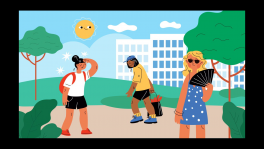A long wait to become giants
At the global level, we have seen some extraordinary changes in research publications during the pandemic

Starting from late March, there has been many discussions, debates, and, of course, confusions over online teaching at the universities of Bangladesh.
Our logic around online education has gone through quite an evolution — "the whole world is in a shambles by the pandemic, how we could even think of education now"; "our students and teachers are not ready for it"; "some private universities are doing it just to make money"; "okay, let us do it, but let's only teach, no exams"; and, finally, "Alright, let's go for full-fledged online teaching at all universities, after all, it is our youth's future at stake".
In all this chaos, we almost forgot about the other responsibility of our universities — doing research.
Despite all uncertainties, the pandemic-shutdown gave academics a break from the teaching load and some time to think about research. Of course, researching in the labs not possible for many, since the campuses are closed. But, academics could use this lockdown time to develop research projects with their research partners at home and abroad.
They could use this time to go back to the old data that they always wanted to analyse, but could not do due to teaching and administrative responsibilities. They could also bring out those unfinished research manuscripts in their laptops, finalise them, and then submit to a peer-reviewed journal.
Some of them can succeed in publishing journal articles in the lockdown time — after all publishing our research is a crucial part of our development and an important way to measure the impact of our research on our society, economy, and environment.
At the global level, we have seen some extraordinary changes in research publications during the pandemic.
First, big academic publishers, like Elsevier, Springer Nature, and Taylor & Francis, have made their Covid-19-related research papers freely accessible to all — otherwise, researchers from developing countries would have to pay huge amount of US dollars to look at, rent, or buy those articles.
Second, during the pandemic, there has been a significant increase in number of research and research publication, especially on the pandemic.
The research article publishing time also got much shortened — it used to take several months to publish a paper in a journal, but the Covid-19 research papers took only about a week after submission of the manuscript.
Third, studies also showed that, during the pandemic, female academics were submitting a lesser number of research papers and starting lesser number of new research projects compare with their male counterparts, because women scholars have to attend to increased childcare responsibilities.
There is no readily available data on how many research papers have been published by Bangladeshi researchers during the on-going pandemic. Or if the pandemic-lockdown has any positive or negative impact on the research system of our universities.
On 17 August, I did a quick search on Google Scholar — a free online search engine we use to find research literature. I found that this year, 40,200 documents were published with "Covid-19" in their titles. Of them, 195 (or 0.5 percent) documents included both "Bangladesh" and "Covid-19" in their titles, indicating a reasonable number of published Covid-19 research on Bangladesh.
To know how they had been doing with research and research writing, I recently talked with some of my academic friends and colleagues.
Their responses were mixed. Some of us were modestly productive in terms of doing survey-based or desk-based research and writing and publishing research papers.
But, most of us could not focus on research per se — anxiety around pandemic kept us worried about our families, we got depressed from media reports and news of corona-positive cases and deaths, some of us even started questioning the meaning of our career, ambition, and life.
It is not clear if the 155 universities of Bangladesh have yet looked into the state of their research systems during the pandemic.
Master's students and PhD researchers do most of the research at our universities — all are now away from campuses due to the closure. Maintenance of research lab facilities and infrastructure is another concern during a pandemic.
In terms of financing research, many university faculty members regularly receive research grants through their networks. Although reliable data is hard to find, this makes up a significant portion of research support in Bangladesh.
Pandemic has indeed affected research outputs by the faculty members as well as their search for new funds.
At the institutional level, allocations for research is quite limited in Bangladesh. For example, out of its US$ 102 million budget for 2020−21, the University of Dhaka — the oldest university of Bangladesh — has allocated 1.09 percent to research.
At the national level, the government invests in research by offering scholarships, fellowships, grants, and direct funding to universities and different agencies operating under the Ministry of Education.
In 2020−21, the total budget allocated for research is US$ 12.4 million (US$ 1 = Bangladesh Taka 85), which is 0.3 percent of the US$ 3.9 billion budget of the Secondary and Higher Education Division of Bangladesh.
There is no data on the total research and development (R&D) expenditure of Bangladesh, but the total R&D budgets of the education, information & communication technology, and science & technology ministries expected to be a very small portion of our US$ 303 billion GDP.
We sometimes see stormy debates on media over the non-existence of our universities in the global university rankings.
The reason is simple — research and academic publications are a crucial part of those rankings and we as a nation are very much lagging in this area.
When, for example, the reputed Times Higher Education's (THE) World University Ranking calculated 60 percent points based only on research and impact of research, it is very difficult for our universities to qualify.
In 2018, THE launched Impact Ranking of universities focusing on their contributions to the Sustainable Development Goals (SDGs).
In 2020, five Bangladeshi universities made on that list of 768 universities. Even that rather relaxed ranking system has allocated 27 percent points for research and/or impacts of research.
Coming back to a pandemic, about 355 years back, Sir Isaac Newton had to stay at home to survive the Great Plague of London.
During that time, he did some world-changing works, like developing "calculus". I always admire one of his quotes from 1675 — "If I have seen further it is by standing on the shoulders of Giants."
His words metaphorically appreciate the value of fellow researchers and scientists, the contributions of fellow thinkers, in advancing global knowledge from which mankind has always got benefitted from. I strongly believe, as researchers, we stand on the shoulders of giants to become giants.
Now the question is — as we are restructuring our society and structures to respond to the pandemic, will we be able to change our universities' research system to allow us to become giants?
Dr Haseeb Md Irfanullah is an independent consultant working on environment, climate change, and research systems. his twitter handle is @hmirfanullah.


 Keep updated, follow The Business Standard's Google news channel
Keep updated, follow The Business Standard's Google news channel
















